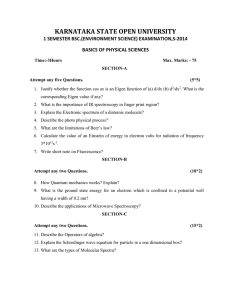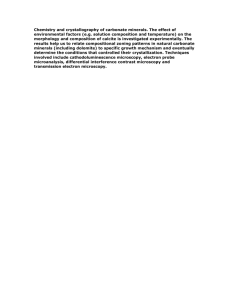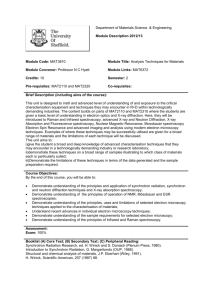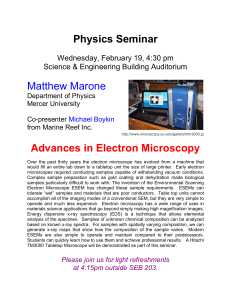A brief introduction to Condensed Matter Physics at Davis and
advertisement
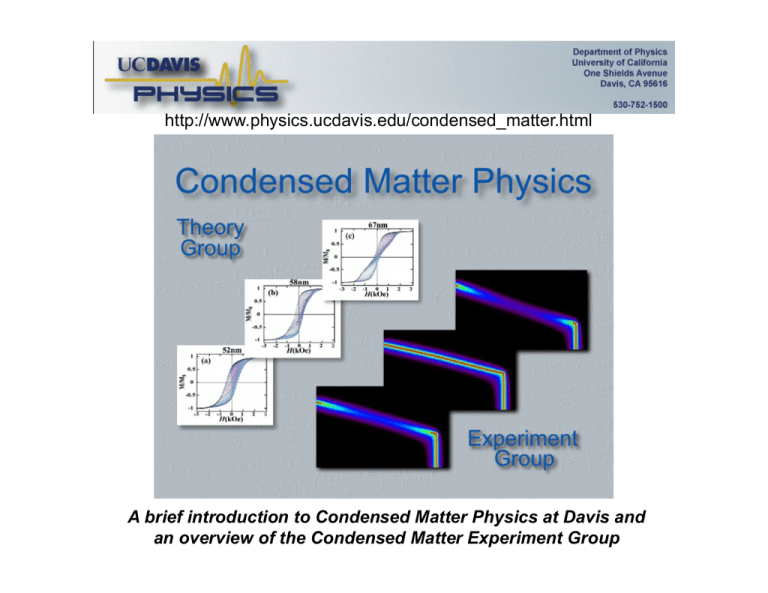
http://www.physics.ucdavis.edu/condensed_matter.html A brief introduction to Condensed Matter Physics at Davis and an overview of the Condensed Matter Experiment Group The Past-- 30 Years of Nobel Prizes in Condensed Matter Physics— 1980-present HIGHLIGHTED (UCD CM EXPERIMENT AND CM THEORY FACULTY RESEARCH) 1. 2011 GROUNDBREAKING EXPERIMENTS REGARDING THE TWO-DIMENSIONAL MATERIAL GRAPHENE NOVEL CIRCUIT ELEMENTS? (PICKETT, SAVRASOV, SINGH) 2. 2009 TRANSMISSION OF LIGHT IN FIBERS FOR OPTICAL COMMUNICATION & FOR THE INVENTION OF AN IMAGING SEMICONDUCTOR CIRCUIT – THE CCD OPTIC FIBERS, THE CCD 3. 2007 DISCOVERY OF GIANT MAGNETORESISTANCE, LEADING TO SPINTRONICS HARD DRIVE READ HEADS, MAGNETIC RAM/LOGIC (FADLEY, LIU, SINGH, ZIMANYI,…) 4. 2003 PIONEERING CONTRIBUTIONS TO THE THEORY OF SUPERCONDUCTORS AND SUPERFLUIDS SUPERCONDUCTIVITY (PICKETT, SAVRASOV, ZIEVE, …) 5. 2001 ACHIEVEMENT OF BOSE-EINSTEIN CONDENSATION IN DILUTE GASES OF ALKALI ATOMS, AND FOR EARLY FUNDAMENTAL STUDIES OF THE PROPERTIES OF THE CONDENSATES BOSE EINSTEIN CONDENSATION OF ATOMS 6. 2000 DEVELOPMENT OF SEMICONDUCTOR HETEROSTRUCTURES USED IN HIGH-SPEED- AND OPTO-ELECTRONICS, AND INVENTION OF THE INTEGRATED CIRCUIT THE INTEGRATED CIRCUIT,, THE IT WORLD 7. 1998 DISCOVERY OF A NEW FORM OF QUANTUM FLUID WITH FRACTIONALLY CHARGED EXCITATIONS THE QUANTUM HALL EFFECT, FRACTIONAL CHARGE--THEORY 8. 1997 DEVELOPMENT OF METHODS TO COOL AND TRAP ATOMS WITH LASER LIGHT LASER TRAPPING OF ATOMS 9. 1996 DISCOVERY OF SUPERFLUIDITY IN HELIUM SUPERFLUID HELIUM 10. 1994 DEVELOPMENT OF NEUTRON SPECTROSCOPY & DEVELOPMENT OF THE NEUTRON DIFFRACTION TECHNIQUE NEUTRON DIFFRACTION AND SPECTROSCOPY 11. 1991 DISCOVERING THAT METHODS DEVELOPED FOR STUDYING ORDER PHENOMENA IN SIMPLE SYSTEMS CAN BE GENERALIZED TO MORE COMPLEX FORMS OF MATTER, IN PARTICULAR TO LIQUID CRYSTALS AND POLYMERS THEORY OF POLYMERS AND LIQUIDS CRYSTALS 12. 1987 THE DISCOVERY OF SUPERCONDUCTIVITY IN CERAMIC MATERIALS HIGH TEMPERATURE SUPERCONDUCTIVY (CURRO, (CURRO PICKETT PICKETT, SAVRASOV SAVRASOV,…)) 13. 1986 FUNDAMENTAL WORK IN ELECTRON OPTICS, AND FOR THE DESIGN OF THE FIRST ELECTRON MICROSCOPE & DEVELOPMENT OF THE SCANNING TUNNELING MICROSCOPE ELECTRON AND SCANNING PROBE MICROSCOPIES (CHIANG,FADLEY) 14. 1985 DISCOVERY OF THE QUANTIZED HALL EFFECT THE QUANTUM HALL EFFECT, FRACTIONAL CHARGE-EXPERIMENT 15 15. 1982 THEORY FOR CRITICAL PHENOMENA IN CONNECTION WITH PHASE TRANSITIONS PHASE TRANSITIONS (SINGH) 16. 1981 CONTRIBUTION TO THE DEVELOPMENT OF LASER SPECTROSCOPY LASER SPECTROSCOPY AND DIFFRACTION (ZHU) & CONTRIBUTION TO THE DEVELOPMENT OF HIGH- RESOLUTION ELECTRON SPECTROSCOPY PHOTOELECTRON SPECTROSCOPY/PHOTOEMISSION (CHIANG, FADLEY) Approximately half of Noble Prizes in Physics are in Condensed Matter. UCD faculty involved in many areas. Related Recent Nobel Prizes in Chemistry 2007 STUDIES OF CHEMICAL PROCESSES ON SOLID SURFACES SURFACE CHEMISTRY, CATALYSIS (CHIANG, FADLEY) 2000 DISCOVERY AND DEVELOPMENT OF CONDUCTIVE POLYMERS POLYMERIC INTEGRATED CIRCUITS 1998 DEVELOPMENT OF THE DENSITY-FUNCTIONAL THEORY THAT CAN BE USED FOR THEORETICAL STUDIES OF THE PROPERTIES OF MOLECULES AND THE CHEMICAL PROCESSES IN WHICH THEY ARE INVOLVED ELECTRONIC STRUCTURE THEORY (FONG, PICKETT, SAVRASOV, COX) 1996 DISCOVERY OF FULLERENES NANOTUBES, NANOCIRCUITS (YU) 1991 DEVELOPMENT OF THE METHODOLOGY OF HIGH RESOLUTION NUCLEAR MAGNETIC RESONANCE (NMR) SPECTROSCOPY NMR SPECTROSCOPY (CURRO) A Look at the Future-Condensed Matter Physics—The Science of the World Around Us How Do Complex Phenomena Emerge from Simple Ingredients? Strongly correlated materials H How Will the th Energy E Demands D d off Future Generations Be Met? Solar cells, fuel cells,… What New Discoveries Await Us in the Nanoworld? Surfaces and interfaces, novel nanodevices How Will the Information Technology Revolution Be Extended? Nanoscale logic and memory, spintronics What Happens Far from Equilibrium and Why? Many nanoscale systems What Is the Physics of Life? Biophysics Publisher: National Academies Press Pub. Date: December 2007 ISBN-13: 9780309109697 286pp UC Davis Experimental Condensed Matter Physics-People Shirley Chiang Xiangdong Zhu Rena Zieve Nick Curro Low-Temperature Physics Novel & Strongly Correlated Materials Nano-Science Surface/Interface Science Biophysics Energy-Related Research Magnetic Materials Chuck Fadley Linton Corruccini Kai Liu Dong Yu UC Davis Experimental Condensed Matter Physics Special opportunities and facilities State-of-the-art St t f th t in-house i h facilities f iliti + external t l facilities f iliti Small-group hands-on experimental work diverse experience Excellent track record of funding and RA support: 20% of graduate d t students t d t are in i CME Dept./Campus central facilities: X-ray diffraction, nanofabrication, clean room, electron microscopy, NMR, electron spectroscopy,… Connection to special camp campus s initiati initiatives: es Nanomaterials in the Environment, Agriculture & Technology (NEAT)-Liu, Fadley Energy@UC Davis, Lawrence Livermore National Laboratory Yu Laboratory–Yu Unique nearby national facilities: Lawrence Berkeley National Laboratory– Advanced Light Source-Fadley, National Center for Electron Microscopy Molecular Foundry Microscopy, Lawrence Livermore National Laboratory– microscopy, high pressure facilities Multiple collaborations & interdisciplinary research: UCD national UCD, national, international Proximity to high-tech industry in Silicon Valley: a major asset Growth and Surface Dynamics of Metals on Semiconductors: Ag/Ge Shirley Chiang Ag on stepped Ge(111), 0.78 ML at 250°C Low Energy Electron Microscopy (LEEM) Bright = Ag in (√3x√3)R30 (√3x√3)R30º, Dark = Ag in (4x4) Ag/Ge(110), 0 Ag/Ge(110) 0.25 25 ML Scanning Tunneling Microscopy (STM) 5 microns FOV=5µm FOV=5µm, 5.5eV electron energy, Real-Time movies 100 nm x 100 nm, Vsample=-2.0V, It=0.5nA http://www.physics.ucdavis.edu/stm/index.html Low-temperature physics: superconductivity, magnetism, high pressure Rena Zieve squeeze samples to drive phase transitions studyy superconductivity, p y, magnetism g 2 graduate students rotate superfluid helium, creating quantized vortices study vortex motion, waves, and energy loss 2 graduate students http://london.ucdavis.edu/ NMR of Strongly Correlated Electron Systems Nicholas Curro PuCoGa5 NMR of Gallium Frequency T Nature 434, 622 (2005) Unconventional superconductivity and magnetism, heavy fermion physics, quantum phase transitions Studies of nuclear magnetic resonance in extreme conditions: 10mK to 1000 K, 0-60 T, and 0-3 GPa http://www.physics.ucdavis.edu/~curro/ Nanostructure Solar Cells Dong Yu PbS Nano Pine Trees 3 m Colloidal PbSe Nanowires PbS Nanowires Scanning Photocurrent Microscopy Vb = 0V Source Drain I - How do photons convert into charge carriers? - How do sizes of semiconductors affect their properties? - How to make efficient and low-cost solar cells? http://www.physics.ucdavis.edu/~yu/ Nanomagnetism & Spintronics Kai Liu Nanoscale architectures Co C Cu 100 100nm Multilayered Nanowires: Vortex state, giant magnetoresistance, Spin-transfer torque Single Domain Vortex State Single--domain Co Single Vortex--state Co Vortex http://www.physics.ucdavis.edu/~kliu/ Magnetic Frustration at Ultralow Temperatures Linton Corruccini Low temperature magnetism Heat capacity vs T for Gd2Zr2O7 Magnetic order peak Cubic pyrochlore lattice Heat capacity vs T for Tb2Hf2O7 No magnetic order peak Magnetic “Frustration” http://www.physics.ucdavis.edu/Text/Corruccini.html Optical Studies of Surfaces and Thin Films Xiangdong Zhu http://www.physics.ucdavis.edu/xdzhu/ Studies of Surfaces, Nanostructures, and Complex Materials with Novel X-Ray Synchrotron Radiation Methods Chuck Fadley Department of Physics, University of California, Davis M t i l Sciences Materials S i Division, Di i i Lawrence L Berkeley B k l National N ti l Laboratory L b t 40 Depth resolved electronic energy bands in a colossal magnetoresistive oxide nanolayer (Sat. poster) “Spintronics”--Probing Buried Magnetic I t f Interfaces with ith Soft S ft X-ray X Standing Waves 0 Fe (12.8 Å) Fe + Cr (6.8 Å intermix) 40 2 = t2g 1 = eg ky 3d eg 200 300 400 500 pixel 600 700 30 30 20 20 3d t2g 10 0 800 40 4 200 ky 20 500 pixel 600 700 Iron 10 0 800 40 5 200 300 400 500 600 700 800 200 400 600 800 pixel Mn3p Detector Ch. / Angle θ XPD 20 Brillouin Zone 10 0 kx kx Sat’n. 2.8 Å Atomic m moments: mFe 3 30 0 kx MFe 12.5 Å MCr 40Å 4.0 Cr 1-X 400 10 Chrome X 300 30 X 1Composition Magnetization 0 FexCr1-x Japan p 21.1 Å Depth (z) Cr http://www.physics.ucdavis.edu/fadleygroup/ Theory

